#Call to Action Phrase Example
Note
what does tagging dialouge mean exactly
-dragon
.
#dragon anon poster#hi dragon!#were you the one who just posted a snippet?#tagging dialogue (idk if that's the “correct” term but that's what i call it) is how you attatch a phrase onto spoken words!#untagged dialogue is line a one-liner where it's not stated who said something.#for example: “Are you really quite sure about that?”#whilst tagged dialogue has something on the end or the beginning that denotes who's speaking and/or an action.#for example: Galen smile widely and opened his mouth to say[comma] “Honest! My son told me so!”#(sorry - the unicode commas aren't working rn;;;)
4 notes
·
View notes
Text
get anything you desire overnight; what is SATS? how do i use it? — a quick guide.
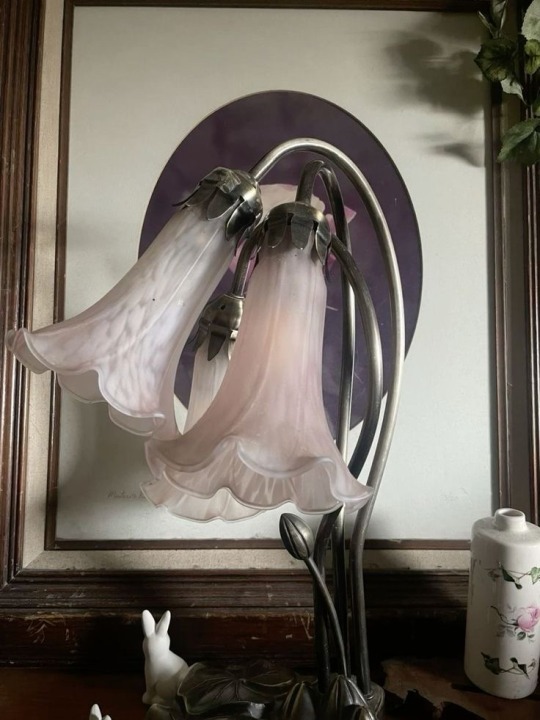


STATS is short for “state akin to sleep,” a phrase used by neville goddard several times.
for example, one of neville's most popular experiments utilizing SATS is called the "ladder experiment". this experiement demonstrates how useful sats is.
what was the experiment?
1. During one of his lectures, Neville instructed his students to visualize themselves climbing a ladder vividly. He asked them to repeatedly imagine this scenario in detail each night before going to bed. They were to feel themselves climbing the ladder, using all their senses to make it as real as possible.
2. on top of this, Neville told them to write down or say affirmations throughout the day such as, "I will not climb a ladder." This was meant to consciously contradict their nightly visualizations, creating a sense of disbelief in the process. The challenge was to see whether their repeated visualization of the ladder would override the conscious denial of the event.
3. Many of the participants reported that within a few days, despite their daily affirmation of "I will not climb a ladder," they ended up encountering situations in which they physically climbed a ladder. The experiment was intended to show that the subconscious mind, which was being impressed by the vivid visualization during the SATS state, was far more powerful than their conscious thoughts or affirmations.
essentially, Neville wanted to show that imagination, particularly when focused in the relaxed state akin to sleep, could create real-life outcomes, aka — attract your desires instantly.
so . . . how do i use SATS?
1. relax. sit or lie down, and relax your mind and body. this method does not need to be used at night. many people have used it during the day and have gone to sleep for only a few moments before waking up with their desire. This is basically just a form of meditation. A similar mental state occurs naturally in the morning right after awakening, and in the evening before bed, hence why some may prefer to do this method at night despite it not being mandatory.
2. embody the feeling. now while in this state, visualize your goal. Feel your desire completely. want someone to text you? imagine yourself opening your phone to that text message. want a new car? imagine yourself feeling the interior, smelling the new car freshener, testing out the radio. whatever it is, fully immerse yourself in the desire.
3. focus and persist. loop this desire on repeat as you fall asleep, it should be the only focus on your mind. quickly shift any other thoughts that may appear, back onto your desire. the more you do this, the more you'll feel the desire completely.
brief comments;
1. over time, it becomes more and more natural. it's very easy to get into the habit of using SATS to manifest whatever you desire. i often find myself using it without even intending to, just randomly deciding i want something and it becomes all i think about as i fall asleep. it's a very natural method that's easy to custom to.
2. yes, you can use this for shifting realities. there's a reason why so many people "randomly" shift when they stop using long complicated methods and just go to sleep with their DR in mind.
3. you don't need to take action. you don't necessarily need to do anything when manifesting. this doesn't just apply for SATS, but any other form of manifestation. you don't need to take action or do anything further to get your desires if you don't feel like it. remember; they're already yours. they can fall into your hands out of the blue. you don't need to put in effort.
i used several different articles and videos for this to explain it in the most simple way possible, since i know a lot of people tend to struggle with understanding this stuff to the maximum!! so i hope this is easy to read! ૮ ◞ ⸝⸝ ◟ ྀིა
4. does this mean affirmations don't work?
no, it does not. affirmations DO still work for LOA. you CAN achieve anything through affirmations, it was never stated that you couldn't or that SATS is the only way. this only states that according to neville goddards experiement, sats appears to be a more powerful method than affirmations and that's how he viewed it. more powerful doesn't equate to the other method being completely incorrect or impossible. i also personally find this method to work a lot quicker as well.. similar to the void state.
edit; i didn't realize i wrote stats in the title and not sats lol, my mistake it was autocorrect
2K notes
·
View notes
Text



The House of Representatives has voted to effectively conceal the death toll from Israel’s war on Gaza.
On Thursday, lawmakers voted 269-144 on an amendment to prohibit the State Department from citing statistics from the Gaza Health Ministry. The measure is part of the annual State Department appropriations bill. It was led by Democratic Reps. Jared Moskowitz, Fla., and Josh Gottheimer, N.J., and Republican Reps. Joe Wilson, S.C.; Mike Lawler, N.Y.; and Carol Miller, W.V.
In total, 62 Democrats joined 207 Republicans in supporting the amendment.Here are the 62 Democrats who joined 207 Republicans to ban giving funds to the State Department to cite the Gaza Health Ministry, undermining the organization’s death & injury figures. https://t.co/n7DveMQaPQ pic.twitter.com/Nas0Fgm4Ag
— Prem Thakker (@prem_thakker) June 27, 2024
While party leaders often push their members to vote “yes” or “no” on any range of proposals, Democratic leadership gave “no recommendation” to its members on how to vote on the amendment. After the House passes the full bill, it will head to the Senate for consideration.
Mohammed Khader, policy manager at the U.S. Campaign for Palestinian Rights Action, told The Intercept that the amendment is part of a trend of anti-Palestinian sentiment in Congress since the start of Israel’s atrocities in Gaza. “By preventing any recognition of the number of Palestinians killed since October, this amendment is a clear example of genocide denial and is no different from what was done towards victims of genocides in Rwanda and Armenia.”
On Wednesday, Rep. Rashida Tlaib, D-Mich., the only Palestinian member of Congress, took to the floor to make a similar argument. “This is genocide denial,” she said.
After reciting the death toll and other statistics about casualties, Tlaib said she intended to introduce the list of Palestinians killed in Gaza to the congressional record. “It is important to note this to everyone here: The list is too long that I can’t even submit it because of the text limit,” she said. “That’s how many have been killed.”
The Ministry of Health is the only official entity tracking the death toll in Gaza; its figures have been cited broadly, including by the U.S. and Israeli governments. Over the last eight months, Israel has killed at least 37,765 people and injured another 86,429, according to the ministry’s latest figures. These numbers are likely an undercount due to the decimated medical infrastructure, killed medical workers, and thousands feared trapped under the rubble in Gaza.
“It’s despicable but not shocking that 62 Democrats joined Republicans to refute the Gaza death toll,” one Democratic staffer told The Intercept. “Democratic leadership should be ashamed for refusing to take a stand and call out the blatant anti-Palestinian racism and genocide denial in our party.”
Moskowitz and Gottheimer are among several Democrats who have repeatedly worked to undermine the movement for Palestinian rights and pro-Palestinian speech.
In April, the pair joined Republicans to lead a resolution condemning the phrase “from the river to the sea, Palestine will be free” as antisemitic. In December, the duo joined Republican Reps. Elise Stefanik and Steve Scalise to lead a resolution condemning university presidents and calling for their resignations for allegedly tolerating antisemitism on campus. In November, the two Democrats joined 20 others in censuring Tlaib, for reasons that included posting a video calling for a ceasefire that contained the phrase “from the river to the sea.”
Gottheimer has gone even further, calling Democrats who don’t support Israel a “cancer” and suggesting that Muslims in America are “guilty” of Hamas’s attack on October 7. Along with Lawler, he headlined a call hosted by No Labels, in which he spoke with university trustees about how to push the FBI to take a bigger role in investigating campus protests. During that call, Lawler suggested that student protests for Palestine were the type of activity that inspired the TikTok ban.
The pair also joined 60 other Democrats in expressing their “disgust” at South Africa’s 84-page suit accusing Israel of genocide and praising White House spokesperson John Kirby for calling it “meritless, counterproductive, and completely without any basic in fact whatsoever.” Not long after, the International Court of Justice concluded that Israel is plausibly committing genocide.
1K notes
·
View notes
Text
How 'The Acolyte' Disappointed Me, and Why the Themes of 'Star Wars' Matter

Someone recently commented on my 'On the Dark Side, the Jedi and the Moral Decay of Star Wars' essay with these words:
"A lot of words for saying 'I don't like the newer media, but I won't get into specifics as to why.'"
Okay! I shall then finally clarify those specifics....
That first essay has, so far, been my biggest success on this blog, and it's attracted a number of interesting responses. Full disclosure: I wrote that fresh off the heels of feeling depressed over how the Acolyte ended, and after reading/listening to several of Leslye Headland's interviews, where she went into great detail about her ideas behind the show's choices, the themes she's trying to get across, and what personal baggage she brings to Star Wars.
Why was I depressed?
Because the show's finale ended with the deeply problematic implication that Osha, by killing Sol and joining Qimir, has achieved true self-actualization. As Leslye herself put it, it's a 'positive corruption arc.' Interesting way to phrase it.
Furthermore, Vernestra's actions that frame Sol for several murders, all to protect her own reputation, and to avoid oversight by the Senate, confirmed one of the things that I was really worried this show would do as soon as we began learning plot details, which is that it's leaning into this very persistent edgelord take that the Jedi are actually big ol' bastards not worth seeing as heroes.
It's the Dave Filoni gospel of the Jedi Order as a morally broken and fundamentally hypocritical institution, a decaying monument to religious hubris, who brought about their own destruction with their arrogance and so-called rejection of emotion making them lack empathy.
This is, as many of my followers know already, a giant misreading of George's storyline in the prequels, and what he was actually telling us about the Jedi's philosophy and code. And in my experience, it gets us some vicious pushback when we try to inform fans of it, even if we back it up with proof of George's words.
George really did intend the Jedi to be the ultimate example of what a brave, wise, and all-loving hero should be, and are very specifically inspired by Buddhist monks. They do not 'repress emotions': they learn to regulate their emotions, so as to not let the negative ones feed the Dark Side, and they have the moral fortitude to focus on their spiritual duty. They're professionals that have dedicated themselves to a higher calling, and who still feel and display the same emotions we all feel, unless I watched very different movies from everyone else. We see that Jedi characters can still crack jokes, cry when they are sad, become scared or anxious, feel strong love and loyalty to their peers, and can even be righteously angry in some situations BUT always knowing when to pull back.
The Jedi of the prequels were victims of manipulation by Palpatine, and were caught in between a rock-and-a-hard-place with the Clone War, and they were ultimately destroyed not by their own actions, but by the treachery of Anakin Skywalker, who failed to overcome his own flaws because he refused to really follow the Jedi teachings, and was gaslit by Palpatine for decades on top of that.
Leslye's take on Star Wars, based on how she wrote the story of the Acolyte, is that "yup, the Jedi were doomed to destroy themselves by being hypocritical and tone-deaf space cops," and she also outright compared them to the Catholic Church (this reeks of Western bias and misunderstanding of Eastern religions). The one that really stunned me, was when she said she designed Qimir to be her own mouthpiece for the experience of being queer and suppressed, who isn't allowed to just be her authentic self in a restrictive world. Which, to me, implies that Leslye wanted to depict the Dark Side as actually a misunderstood path to self-actualization that the Jedi, in keeping with their dogma of repressing emotions, only smear as 'evil.'
Let me remind you all: Qimir is officially referred to as a Sith Lord, by Manny Jacinto, by Leslye, etc. And what are the Sith, exactly?
Space fascists. Intergalactic superpowered terrorists. Dark wizard Nazi-coded wannabe dictators, whose ideology is of might-makes-right, survival of the fittest, and the pursuit of power for power's sake. To depict followers of this creed as an analogy for marginalized people who have literally been targeted and murdered throughout history BY the real-life inspirations for the Sith.... I find revolting and tone-deaf by Leslye.
SO.... seeing how that show ended, and reading up on how Leslye intended it to be interpreted (Osha's 'triumph' over the 'toxic paternalism' of Sol/the Jedi in general), really put me in a funk, because deep down, I could just sense that this was not at all compatible with the ethos of Star Wars. It made me go on a deep-dive into the BTS of the writing of the prequels and George's ideas about the Jedi, and it's how I discovered the truth that Dave Filoni has been pretty egregiously misrepresenting George's themes for several years now, usurping George's words with his own personal fanfic about the motivations of characters like Anakin, or Qui-Gon, or the Jedi Council, etc.
His influence on the franchise has caused this completely baseless take on the Jedi to become so widespread as to rewrite history for modern fans. Who are utterly convinced now that this anti-Jedi messaging WAS George's vision all along, and they get real mad at you if you show them actual proof of that being a lie.
And the Acolyte is perpetuating this twisting of the very core of Star Wars. This is what I meant by the 'moral decay of Star Wars.'
The Star Wars saga was made by George Lucas in 1977 to accomplish these specific tasks:
To remind people of what it really means to be good.
What evil actually looks like, and how it comes from our fears and greed.
To teach kids how to grow up and choose the right path that will make them loving, brave, honest people that stand up to tyrants.
To give the world a story that returns to classic mythological motifs and is fundamentally idealistic, to defy the uptick in cynical and nihilistic storytelling after the scandals of Vietnam and Watergate broke Americans' belief in there being such a thing as actual heroes anymore.
THAT is the soul of Star Wars. That is what George meant for this remarkably creative universe to say with its storytelling. But I sincerely think that what the Acolyte told, was that morality is relative, the heroes of this saga are actually bastards, the fascist death-cult is misunderstood, and a young woman being gaslit into joining said death-cult is a triumphant girlboss moment.
When it actually comes across as the tragedy of a broken person choosing the wrong path that will only make her miserable, full of hatred and powerlust, and hurt innocent people along the way.
The Acolyte betrayed one of George's most critical lessons: that the Dark Side ruins people, and if you want to truly become your best self, you must choose the path of Light, and the Jedi are the ones who have best mastered that path.
So if the future of Star Wars is to continue framing the Jedi and their teachings as some corrupt and immoral system that is making the galaxy worse, then I would rather stick to rewatching the classic scripture of Episode 1-6. George wrote a complete and satisfying story, that is thematically consistent, and in my opinion should have been allowed to rest.
I will not hate on new fans that love the new material, but I will pity them if they really think any of this is actually faithful to George's vision (they may very well simply not care, either, which troubles me too), and I am afraid of a show like Acolyte teaching young people to see the Jedi's philosophy as wrong, and the Sith as having a point.
(P.S. I have a moral duty to clarify this, given the discourse around the show: No, this is not a problem with 'wokeness,' or diversity, or representation; that side of the fandom is very sick in the head and not to be taken seriously.
It's a problem with Leslye's themes and tastes as a storyteller, being fundamentally against the ethos of Star Wars and how it soured the entire show in hindsight for me... a show that I was actually really liking, before the finale dropped its thematic nuke.)
#star wars#star wars thoughts#george lucas#the acolyte#star wars prequels#star wars the acolyte#dave filoni#jedi order#the acolyte critical#pro jedi#leslye headland#leslye headland critical
490 notes
·
View notes
Text
Mainseries Pokemon characters who can be argued to be bisexual-coded (due to their implied crush on the player)
1. Shauna (Pokemon X and Y)
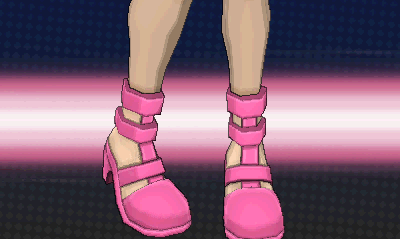
Kalos takes place in France, and Paris is the city of love. So, in the words of Junichi Masuda, "I wanted to implement some elements of romance with Shauna when playing as a boy and express a deep friendship when playing as a girl."
However, due to the VERY few dialogue changes between female vs male protags (as well as actions Shauna takes that are intended to imply romantic interest being the same across all player types, such as her staying behind with the player in the early-game forest), this can be argued to be unintentional bisexual-coding.
2. Lillie (Pokemon Sun and Moon)

Lillie is implied to have a crush on the player. When the player character is female, on Exeggutor Island, she says, "I want to become a Trainer, and learn all the things you know, Selene..." When the player character is male, she says, "I think... I'd like to become a Trainer, too. And travel together with you, Elio..."
Obviously, the difference between these two dialogues makes it pretty clear that they want her dialogue with Elio to be interpreted as more romantically-inclined. However, much like Shauna, Lillie's actions and dialogue varying VERY little otherwise between female vs male protags can be read as unintentional bisexual-coding.
3. Kieran
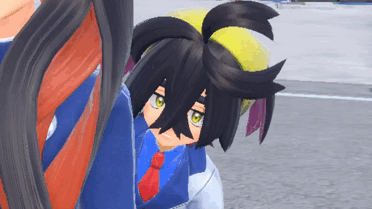
Kieran is the first character here to receive absolutely zero dialogue changes across player gender. Additionally, I'd say he's the character that we get the strongest hints regarding romantic feelings towards the player with.
Kieran has multiple moments where he's implied to feel romantically towards the player. These include, but are not limited to:
His sister saying that he's "been all googly-eyed over you" since you met, and that he "wouldn't stop talking about you - even at home. I seriously couldn't get him to shut up." Kieran reacts with embarrassment when she says this to the MC.
Him saying, "You're...you're special," before pausing, then getting embarrassed and rushing to change the subject.
When the MC calls him a friend, he responds, "What?! R-really?! We're friends? F-friends... I feel all tingly and funny hearing that... Ehehe..."
After the MC changes into their festival outfit, Kieran says, "Whoa...", when seeing them for the first time.
The player can even seemingly flirt with Kieran; when Kieran describes letting Ogerpon move into his home, the player can teasingly ask when they, themself, can move in with Kieran.
These are all very common romantic tropes. I think Kieran is the closest thing that we have to a canonically bisexual mainline character at this moment.
4. Carmine

Carmine has a fewer number of specific moments compared to her brother, but she can still be easily read as having feelings for the player.
Her extreme reaction to Drayton asking the player on a date is the best example, with her bringing her hands up to her face, and saying, "A wha-?!" Once Drayton leaves, Carmine continues fuming. (This can also be chalked up to her general dislike towards Drayton and how he can be manipulative, but the fact that it's that request that sets her off specifically makes this also easily read as jealousy.)
And speaking of...
5. Drayton

While, like Kieran and Carmine, Drayton doesn't have any dialogue changes between if the player is male and female, it's not really clear how he actually feels about them.
He tells the player, male or female, that they can go on a cafeteria date to talk, which the game fully acknowledges as a romantic phrase via Carmine's extreme reaction. He also tells the player, "From one charming catch to another..."
This is very obviously him flirting with the player, but, due to his laid-back and just-a-liiittle-bit-sleazy nature, this more so comes across as him trying to tease the player character, rather than anything earnest.
If nothing else, he's at least confirmed to be comfortable with romantically teasing male classmates, which I would consider a win.
#today on 'azure is bisexual and autistic with a special interest in pokemon (and plans to makes those facts everybody else's problem)'...#let me know if i forgot any details that might be relevant via my inbox!#pokemon#bisexual#bisexual characters#trainer lillie#trainer shauna#trainer kieran#trainer carmine#rival shauna#rival kieran#rival carmine#trainer drayton#elite four drayton#bi characters#bi safe#pokemon sun and moon#pokemon x and y#pokemon scarlet and violet#long post#azure does a thing
1K notes
·
View notes
Text
Ways to Skip Time In Your Stories
Finding ways to skip time in stories can feel challenging. Writers often worry it’ll make their work feel too amateur or negatively affect their pacing.
The truth is that every author includes ways they skip time to maintain their pacing and plot. Check out a few ways to do it with confidence.
1. Start a New Chapter
Yes, it’s really that simple. Go back to your favorite books and note how each chapter ends. You’ll likely find a few of these tricks that transition the story in ways that match the story’s flow.
Ideas to End a Chapter
The protagonist goes to sleep (likely overused, but practical)
The characters end a conversation
One character informs another of a plot twist
Unexpected action occurs, like a car crash
2. Emphasize the Season
You don’t need to tell the reader exact dates or hours to pass the time. You could mention the season instead.
If a scene or chapter ends in the summer and you need your plot to start in winter, make your protagonist mention something about the leaves changing color and giving way to snow before your action picks up again. It will only take a sentence or two, so it’s also an effective method for short stories.
3. Visualize a Movie Montage
Imagine watching a movie about a character who goes on a summer adventure. They backpack through Europe, but they have to take a flight to get there.
You likely wouldn’t see them standing in airport security lines, napping in a terminal or watching a full movie on their flight to their destination. Instead, you’d get a montage of them driving to the airport with a shot of their plane cruising over the open ocean.
Writers can do the same thing, minus the soundtrack in the background. Describe how your character got to their destination when a new chapter or scene starts. Your readers will get the general idea and appreciate getting straight to the plot that made them pick up your story in the first place.
Here are a few ideas to do this in just a few sentences:
One delayed flight and a bad airplane dinner later, I was walking out of the Amsterdam-Schiphol Airport with an aching back and excited heart.
My trip began with the perfect flight. I got an entire row of seats to myself, which made napping through the trip much easier. A flight attendant roused me awake when it was time to land. I couldn’t believe how fast I’d arrived in Athens that quickly.
My flight was just long enough to catch up on the movies I’d been missing over the last year. The landing gear bounced along the runway in Rome just as the Barbie credits started flashing across my iPad.
4. Showcase Some Confusion
Sometimes we aren’t aware of what time it is. We only know time has passed. That might be the best way to make time pass in your story if your protagonist gets confused, caught by surprise, or otherwise discombobulated.
These are some examples:
I woke up with a bad taste in my mouth. The sun was already peaking in the clear blue sky. How long had it been since my explosive video call with my ex the night before?
The time machine landed with a thud that knocked me to the ground. The control panel exploded in shimmering sparks. What year was it?
Working a double shift always left my brain spinning. I left work, walking across the parking lot with only the stars watching my back. I could feel the hours aching in my feet, but didn’t care what time it really was. I just needed to sleep.
5. Employ a Phrase
There are many quick phrases you can use to make your time jumps immediately clear. Consider using a few of these when you feel creatively stuck:
Later that morning
A few weeks later
After months of trying
Six hours later
The following week
As the store closed for the night
-----
There are many other ways to make time pass in a story. Starting with these could help you figure out the best way to move your story forward without disrupting its pacing.
Remember, you’re in control of your story at all times. There’s always a way through creative challenges if you take a deep breath and try something new.
#writing chapters#writing scenes#chapter writing#scene transitions#chapter transitions#writing transitions#writeblr#writing advice#writing tips#writers of tumblr#creative writing#writing#writing community#writing inspiration#writing help#writing resources
1K notes
·
View notes
Text
The thing that kills me is- history has shown us time and time and time again that people in positions of power who fuck up immensely like this then try to cover up, use half-truths and outright lies, and try to keep a lid on a growing scandal never
never
come out of it on top. Chernobyl, Watergate, the BP spill, these are more extreme examples, but even in the realms of social media, the likes of James Somerton show us that when one is caught in the act of doing something wrong- as our dear CEO has now- doubling down, justifying a shoddy decision based on the flimsiest pretext, no matter the scale of the original failing or crime, always makes it worse.
“the cover-up is worse than the crime” is a tired old phrase, but it bears water in every case I’ve ever studied as a history buff. The only way to save face is to turn 180, apologize honestly and profusely, and learn a lesson, take your well-deserved licks for what boils down to your failure.
Because here’s the thing. The more you dig in, the deeper you dig the hole you’re putting yourself in, and no matter the scale of the initial mistake, it gets harder and harder to climb out of that hole until you can only find solace and support in the crazies who nobody gives credence to as a matter of course, as so many techbros who think themselves gods of tolerance have, or it explodes in your face (figuratively, of course. Don’t call the FBI, that’s called a “comical exaggeration,” take note.)
It’s PR 101. Don’t argue out your fuck-up, show some goddamn humility before your actions humble you in a way that is many times more devastating to your reputation and bottom line.
549 notes
·
View notes
Text
Siffrin deals with his anxieties (both rational and irrational) by performing rituals and compulsions. These rituals can become obsessive, especially in times of heightened stress, and often focus around either checking things, or numbers. They also deal with intrusive thoughts, with such frequency and intensity that it impacts their ability to function. Those...are all symptoms of OCD.
Let's define some terms, before we go into examples. What are obsessions in this context? This often refers to obsessive thoughts/anxieties/mindsets. These are prevalent, reoccurring, sometimes disturbing, often irrational fears. Intrusive thoughts are one example of this, though not all obsessions are intrusive thoughts. Intrusive thoughts are specifically unwanted and very distressing and often graphic thoughts or images in one's mind. An example of such is this:

Next, are compulsions and rituals. Compulsions are actions that one takes to break the obsession spiral. These either soothe the root fear (though usually temporarily), or quiet the disturbing thought or image. Rituals are "safe" compulsions, decided as such either by repetition or irrational logic. The wording that Siffrin uses when questioned about obsessive checking of pillars is as follows:

One of the most common mental justifications for compulsions is "But what if?". The perceived cost of performing a compulsion is often weighed as nothing against the potential of something truly awful happening. "What if?" carries a lot of weight for people dealing with OCD- often one knows that both the fears and the compulsions are irrational and logically one cannot control the Universe by tapping a certain amount of times on a table, checking for the tenth time if your alarm was set, or repeating a phrase multiple times in your mind. However, the weight of the potential fear is just so great that one cannot take the chance, even knowing that. This paradoxical position of both awareness and delusion that many with OCD have is called "OCD with insight" (1)
This post became....much longer than I planned, so the rest will be under the cut. Please read the rest though!!! There's so much more to it! ☆
The diagnostic criteria for OCD in the ICD (2) and the DSM (3) are relatively similar (though the DSM focuses a lot more on ruling out other causes for similar behavior like anxiety disorders and delusional disorders), and focus on the obsessions being self-sustaining and the rituals being often time consuming and frustrating to have to do. However, not all compulsions are even notable enough to the person to cause any frustration or discomfort, nor are all of them consciously done with any sort of logic behind them. It's quite common for people to perform compulsions without even having a reasoning for why (4).
Hey, weren't we talking about Siffrin ISAT? What's with all this research paper bullshit? Can't you just show me where in the game my blorbo shows signs of mental disorders???!?
Well, one example of rituals that Siffrin engages in is repeating phrases, either out loud or in their head. The number they tend to come back to, again and again, is three. This is shown when they are explaining Wish Craft, and despite the fact that the specific number of repetitions of your wish genuinely doesn't matter, just that it's repeated at all, they instinctively say to repeat your wish three times, before catching themselves and correcting their error.

...When Loop explains their Wish to Siffrin, they say it three times as well. "I wished it could be over. I wished I could get out of here. I wished for someone to help me."
Whenever Siffrin wants something to go right, throughout the game, he also almost always repeats his desired outcome three times.

It's a noticeable enough habit that his party members mention it, when in the trap room. They've noticed the ritualistic mumbling that he does whenever he wants something to go right.
It's not just when they want something to go right that they're doing it though. They repeat things three times when they're panicking, too, to calm themselves down. When they loop back after beating the king:

It's not even just thinking or saying things either, they take actions in threes too, to soothe themselves. After Kingquest:
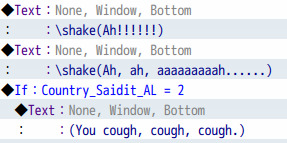
You can see both thinking things in threes and acting in threes here. It's everywhere. If you look through the game again, you won't be able to help but notice how often they do things in threes.
Speaking of the coughing though, that's another one of the compulsions they do. Covering their mouth, coughing, gagging, they do all of those when trying to banish disturbing memories or thoughts from their mind.
After looping when refusing to try to say the name of their country when the King asks.

Notice again, they repeat "You know" three times. Like I said, you'll start seeing that EVERYWHERE now.
To note, if you try to say it once and try not to say it another time, you'll get this instead:

Three breaths, here.
I could go on, but I don't think I need to.
Another important factor when considering OCD is the need for control. People with OCD not only report a lower level of perceived control over their thoughts and actions, and not only tend to need a higher level of control than the average person to feel safe and comfortable, but also, the less control over their environment they have, the more that OCD symptoms often intensify. (5)
Siffrin is in a paradoxical position here, in regards to control. When they first realize they're in a timeloop, they're absolutely ESTATIC. The first bathroom break monologue exemplifies exactly WHY he's so euphoric at this point:

He's euphoric with CONTROL. No matter what happens, he can always try again. He's safe. He can keep everyone he loves safe. He has SO MUCH CONTROL.
When the illusion shatters, after he's dragged back when they beat the king, that's when he realizes how little control he actually has. Sure, he can decide when he loops (most of the time) but he can't decide to STOP looping. He's trapped. The more he tries to escape, the less control he seems to have (Eg, what happens to Bonnie). After that, we can see him start to have intrusive thoughts, engage in more ritualistic behavior, and end up in more unhealthy anxiety spirals.
...And, we see him lean into the little control he DOES have (looping) more. Any time he's in a stressful situation? Any time that the control he has over a situation starts slipping away? Is Bonnie yelling at him with tears in their eyes and telling him to die? Is Isabeau pulling away from their shaking grip on his collar? Is Odile confronting him on his suspicious behavior? Are things OUT OF CONTROL? ...Control is taken back. Forcefully. He can't handle loosing more control, not when he already feels so helpless and trapped.
Talking about the bathroom scenes, there's another one I want to point out. The first Friendquest run. It's the perfect example of delusional anxieties and compulsions used to quiet the distressing thought, rather than soothe them.

...Yeah.
Siffrin is suddenly overcome with the anxiety that the simple act of believing that his plan could work will somehow make it not come true anymore. This is an example of "magical thinking", or a belief that defies the scientific or culturally accepted laws of causality (eg. "If I step on a crack, my mother's back will break"). It's specifically an example of TAF, or "Thought-action fusion", which is the belief that one's mere thoughts can cause completely unrelated actions to happen in the real world. This is an essential part of how compulsions can genuinely relieve anxiety, and is actually one of the differences between those with other anxiety disorders and those with OCD. Magical thinking is essential to OCD. (6)
This exchange also showcases an example of how compulsions done to quiet rather than to soothe can sometimes involve self harming behaviors to "shake" the thought out of one's mind. In this case, him hitting his own head and focusing on the pain rather than on the thought. Most definitely not a healthy way to deal with it! But what else do we expect from Siffrin, honestly.
Another example of a self-harming compulsion being used to "shake" out a distressing and unwanted thought, also including a more minor example of magical thinking:

Researchers and psychologists have often attempted to divide OCD into subtypes. This has usually been done because different types of obsessions often demand different treatment plans. (7) The actual divisions have varied from researcher to researcher, but one type that consistently comes up, is harm OCD/moral OCD. (Of note, one person usually, but not always, fits into multiple subtypes. I personally think Siffrin fits into multiple) Harm OCD is characterized by a fixation on believing one is a bad person and causing harm to others, often despite others expressing the contrary. This often comes along with very intense self-criticism and judgement.
After repeating a Friendquest route multiple times:

Mal Du Pays fight:

Siffrin specifically is fixated on the worry that the knowledge that they gained by looping gives them an unfair power dynamic with their party, and taking any action informed by that knowledge means that they're taking advantage of them or forcing them to do what he wants. This is despite the fact that, no matter what he chooses to do, they are still autonomous beings who do what they want. He has less control than he thinks.
Also from the Mal Du Pays fight:


("You should've died for me. You should've died to protect me. You should've died to protect me.", "You can wish and wish and wish all you want.", "They'll forget you. They'll forget you. They'll forget you.")
And what of Loop? They're also a Siffrin, right? Examination of the self from an outside perspective has given them time to introspect a bit more. They directly name and point out one of Siffrin's rituals. @dormont pointed this out, in one of his posts. (8)
Loop says, here:

They understand why Siffrin is doing this. Siffrin is afraid that he'll forget again. There was no warning, before the Island vanished from everyone's mind. The coin is a physical reminder that he forgot his first family, that he can't forget this one too. He often rolls it in his pocket, but sometimes grips it tightly, or flips it. In his mind, touching it will prevent him from forgetting again.
Now this is fascinating when thinking about One Hat, because in that eventuality Siffrin, after failing to find Loop at the Favor Tree, leaves his coin where Loop used to sit. This shows that he's doing better mentally, in Act 6. That he trusts himself more to remember, that he doesn't need the coin anymore.
Throughout the game, Loop keeps the comedy mask glued tight to their starry face. Because of that (and the fact that we don't see inside of their head), we don't get to see much of their own obsessions or compulsions. But there is one time where their mask slips. During Two Hats.
When they start becoming more and more distressed, they fall back into repetitions of three:


And if they win the fight....

And after the fight...

But of course, it's not all in distress. What was I saying, at the start of the post? The other reason why Siffrin repeats things in threes? When he wants something to go right, right? When he has a desired outcome, when he's sharpening his knife, when he's carving a figure. "Please be sharp, please be sharp, please be sharp."? At the end of it all, as Loop is fading away:

"I'll see you again soon, I promise! I super promise! I super duper promise!"
And Siffrin understands exactly the intention and desire that they pressed into that repetition. After Loop is completely gone, they mirror their actions.

("You flip it once, twice, three times.")
("You will see each other again.")
Additional resources:
1: Taylor, E. (2020). Discordant knowing: A puzzle about insight in Obsessive–Compulsive Disorder. Mind & Language, 37(1), 73–93. https://doi.org/10.1111/mila.12301
(About the concept of insight in irrational cycles in OCD! Very interesting)
2: ICD 10: The complete official code set. Internet Archive. (2017).
(ICD 10, Account is needed to read the full thing)
3: American Psychiatric Association. (2013). Diagnostic and statistical manual of mental disorders (5th ed.)
(DSM 5, for reference)
4: Starcevic, V., Berle, D., Brakoulias, V., Sammut, P., Moses, K., Milicevic, D., & Hannan, A. (2011). Functions of compulsions in Obsessive–Compulsive Disorder. Australian & New Zealand Journal of Psychiatry, 45(6), 449–457. https://doi.org/10.3109/00048674.2011.567243
(Article about reasonings behind compulsions. Honestly I think a lot of the "other reasons" categorized here for compulsions are just...different manifestations of reducing anxiety. But it's still helpful to show how sometimes compulsions are done subconsciously)
5. Moulding, R., & Kyrios, M. (2007). Desire for control, sense of control and obsessive-compulsive symptoms. Cognitive Therapy and Research, 31(6), 759–772. https://doi.org/10.1007/s10608-006-9086-x
(Article around OCD and the need for control)
6. Kingdon, B. L., Egan, S. J., & Rees, C. S. (2011). The illusory beliefs inventory: A new measure of magical thinking and its relationship with obsessive compulsive disorder. Behavioural and Cognitive Psychotherapy, 40(1), 39–53. https://doi.org/10.1017/s1352465811000245
(Article about magical thinking/TAF/history of the other studies done on the importance of them in OCD & creating a better framework to assess them)
(7) McKay, D., Abramowitz, J. S., Calamari, J. E., Kyrios, M., Radomsky, A., Sookman, D., Taylor, S., & Wilhelm, S. (2004). A critical evaluation of Obsessive–Compulsive Disorder subtypes: Symptoms versus mechanisms. Clinical Psychology Review, 24(3), 283–313. https://doi.org/10.1016/j.cpr.2004.04.003
(Critical overview of the concept of OCD subtypes and what their purpose is)
(8)
(Eve's post :]. Check the replies for more elaboration!)
#isat#in stars and time#isat siffrin#isat loop#siffrin#isat spoilers#MAJOR spoilers !#soliloquy#long post
378 notes
·
View notes
Text
Eight Strategies for Improving Dialogue in Your Writing
Well, hi! Oh my… wow! It’s been a long time since I’ve posted! I’ve been very busy and I am genuinely sorry to all my followers, but that doesn’t mean I’ve forgotten about this account, but here is one final post for the year!
Hopefully next year I become consistent with it again!
Let’s begin!
One of the best ways to help a reader connect with your writing is by crafting excellent dialogue. Use these tips to learn how to write dialogue that showcases character development, defines your characters’ voices, and hooks readers.
Why Use Dialogue?
Good dialogue performs all sorts of functions in fiction writing. It defines your characters’ voices, establishes their speech patterns, exposes the inner emotions, and showcases their character development. Beyond mere characterization, effective dialogue can also establish the setting and time period of your story and reveal information in a way that doesn’t feel overly expository.
Authors use lines of dialogue to reveal a character’s personality and express their point of view. For instance, an archetypal football coach might speak in short, terse sentences peppered with exclamation points and quotations from famous war generals. By contrast, a nebbish lover with a broken heart might drone on endlessly to his therapist or best friend, speaking in run-on sentences that circle around his true motivations. When an author can reveal character traits through dialogue, it cuts down on exposition and makes a story flow briskly.
Eight Writing Tips for Improving Dialogue
The first time you write dialogue, you may find it quite difficult to replicate the patterns of normal speech. This can be compounded by the concurrent challenges of finding your own voice and telling a great story overall. Even bestselling authors can get stuck on how a particular character says a particular line of dialogue. With practice and hard work, however, lackluster dialogue can be elevated to great dialogue.
Here are some strategies for improving the dialogue in your own work:
Mimic the voices of people in your own life. Perhaps you’ve created a physician character with the same vocal inflections as your mother. Perhaps your hero soldier talks just like your old volleyball coach. If you want to ensure that your dialogue sounds the way real people speak, there’s no better resource than the real life people in your everyday world.
Mix dialogue with narration. Long runs of dialogue can dislodge a reader from the action of a scene. As your characters talk, interpolate some descriptions of their physical postures or other activity taking place in the room. This mimics the real-world experience of listening to someone speaking while simultaneously taking in visual and olfactory stimuli.
Give your main character a secret. Sometimes a line of dialogue is most notable for what it withholds. Even if your audience doesn’t realize it, you can build dynamic three-dimensionality by having your character withhold a key bit of information from their speech. For instance, you may draft a scene in which a museum curator speaks to an artist about how she wants her work displayed—but what the curator isn’t saying out loud is that she’s in love with the artist. You can use that secret to embed layers of tension into the character’s spoken phrases.
Use a layperson character to clarify technical language. When you need dialogue to convey technical information in approachable terms, split the conversation between two people. Have one character be an expert and one character be uninformed. The expert character can speak at a technical level, and the uninformed one can stop them, asking questions for clarification. Your readers will appreciate it.
Use authentic shorthand. Does your character call a gun a “piece” or a “Glock”? Whatever it is, be authentic and consistent in how your characters speak. If they all sound the same, your dialogue needs another pass.
Look to great examples of dialogue for inspiration. If you're looking for a dialogue example in the realm of novels or short stories, consider reading the great books written by Mark Twain, Judy Blume, or Toni Morrison. Within the world of screenwriting, Aaron Sorkin is renowned for his use of dialogue.
Ensure that you’re punctuating your dialogue properly. Remember that question marks and exclamation points go inside quotation marks. Enclose dialogue in double quotation marks and use single quotation marks when a character quotes another character within their dialogue. Knowing how to punctuate dialogue properly can ensure that your reader stays immersed in the story.
Use dialogue tags that are evocative. Repeating the word “said” over and over can make for dull writing and miss out on opportunities for added expressiveness. Consider replacing the word “said” with a more descriptive verb.
918 notes
·
View notes
Text
Grace and the Lords in Black: an analysis.
Okay, so, this may be obvious; although I haven’t seen anyone mention this as of yet. The link between Grace Chastity and the Lords in Black is clear, I mean we’ve all agreed that she seems to be like that, and Dirty Dudes must Die highlights her “corruption” plainly.
That being said! I think there may be more.
Firstly, the Lords in Black mention/talk to Grace first, before Peter and Stephanie (the arguable proper protagonists of this story).
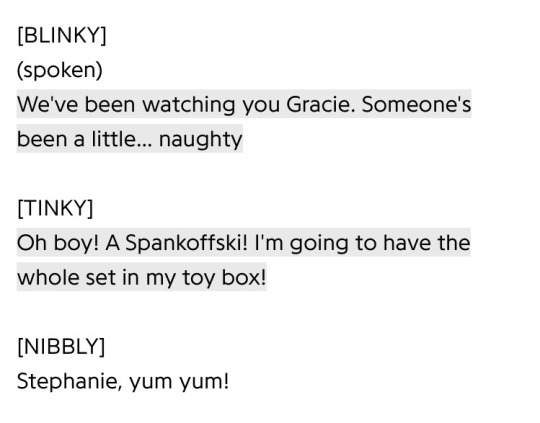
Sure, Blinky’s motif is obvious, it’s of eyes, of watching and of observation. But to speak to Grace first, even if it seems (on the surface level) that it’s just to flex their omniscience and make her uncomfortable, is a little strange. Especially since they then speak mostly (only) to Steph for the rest of the song [The Summoning].
Secondly, because if that were all this wouldn’t be a very good analysis, we have her (Grace) and Nibbly being echoes of eachother.


“Swallow” and “devour” are synonymous. Both fit into Nibbly’s motif of consumption. Now, Grace could’ve said anything. Absorb, harness, control etc. I think the wording here is particular. Not exactly the same, but clearly within the same ball park.
What is exactly the same though, is Grace Chastity and Wiggly.
This may seem a bit out of left field at first, but hear me out.
In The Summoning, it is said that “Wiggly wants his Wrath”, Wrath is a vice, a sin. It may not be the exact opposite of Chastity, however Chastity is to do with restraint, whereas Wrath is very much, not so. Moreover, Wrath can be defined as ‘a great anger that expresses itself in a desire to punish someone’. Now… who else could be described as wrathful? Obviously Max. And Grace. I mean, her song is called Dirty Dudes must Die. As well as being a direct reflection of Max, it implies that she wants to harm someone. Punish someone though? Well, yes. Grace says “This is the consequence of what you’ve done!” - she must believe that death is a worthy punishment for their actions (being ‘pervs’). Thus, Wrath.
Lastly, and this is where the exactly comes in, Grace and Wiggly both say the same things. (Again, of course, I could write another analysis on how Grace and Max reflect each other beautifully by also saying the same/extremely similar things) The difference between Grace saying similar things to Max, is that she and Wiggly aren’t similar. It’s the same.
Example A) Stephy / Stephie.
Upon rewatching Nerdy Prudes Must Die and listening to the album on repeat, I noticed that no one bar these two call Stephanie: Stephie. I know Grace calls Ruth, Ruthy and Peter, Petey- so her calling Stephanie, Stephie, makes sense linguistically. That doesn’t take from the fact that Wiggly is the only other ‘person’ to use that particular moniker.

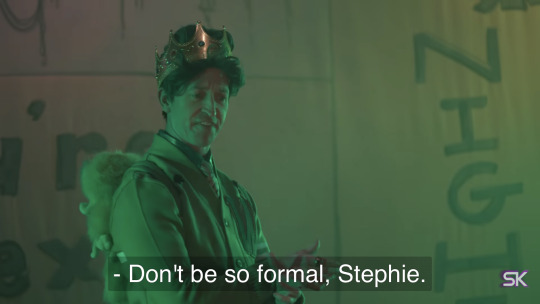
Example B) “bloody bits”
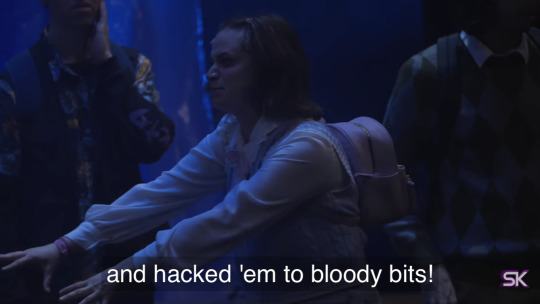
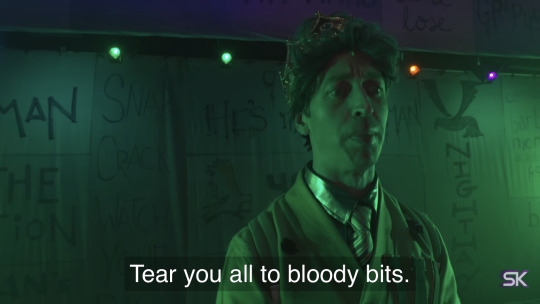
A particularly strange phrase that these two say. However, not really. The point of this analysis is to point out the links between the Lords in Black and Grace Chastity, specifically Wiggly and Grace. By pointing out the parallels in their idiolects, I have come to the conclusion that they are not only linked but INCREDIBLY similar.
Both are characters that use cutesy, almost childish language (“mommy spot” / “belly-well”) to disguise the violence, the wrath that lays beneath the surface. Wiggly (as shown in Black Friday) uses it as a facade. Throughout Black Friday and throughout The Summoning, he expresses himself as non-threatening (“We’re all pally-wals.” etc) before eventually showing what’s beneath the surface (“..deck the fucking halls!” / “We don’t give a shit about your phone!”). Both times are as abrupt as each other, showing that Wiggly has a fairly short temper. Grace doesn’t necessarily have a short temper, instead she has periods of ‘sin’, when stressed: Dirty Girl, calling “God a son of a B-Word”, smoking (after), having sex with Max, the scene of her ordering hot water etc etc. The visage, her carefully constructed facade, slips. Wether it’s because deep down she doesn’t believe in God (possibly shown in her “are you religious?” conversation with Shapiro), or that due to her upbringing she’s being confined, restrained, controlled, and this is when her ‘true self’ begins to peer through the cracks.
Either way, these are two characters who use similar themes (one of childishness, the other of purity/innocence (which can also be linked to childishness)) to cover their violence, their real selves.
Uhhh- anyway, watch Nerdy Prudes must Die on Youtube- it gave me brain worms.
#starkid#starkid productions#nerdy prudes must die#starkid npmd#hatchetverse#hatchetfield#starkid analysis#npmd#npmd theory#npmd analysis#tw long post#long post#essay#media analysis#character analysis#wiggly#wiggog y'wrath#grace chasity#npmd grace#lords in black#starkid musicals#lyric analysis#musical analysis#tickle me wiggly#the summoning#dirty dudes must die#bliklotep#nibblenephim#nibbly#blinky
987 notes
·
View notes
Text
A Writing Refresher: Basic Grammatical Terms
Adjective: A word which qualifies or modifies the meaning of a noun; as in a 'red hat' or a 'quick fox'. They can be used to complement the verbs 'to be' or 'to seem' ('Sue seems happy today'). Adjectives are sometimes formed from nouns or verbs by the addition of a suffix such as '-able' (lovable), '-ful' (heedful), '-ic' (heroic), '-ish' (foolish), '-ive' (combative), '-ous' (famous), or '-y' (needy).
Adverb: A word which qualifies or adds to the action of a verb: as in 'he ran quickly', or 'he ran fast'. Adverbs can also qualify adjectives, as in 'the grass is intensely green'. They are usually formed by adding '-ly' to an adjective: 'playfully', 'combatively', 'foolishly'. They can also sometimes be formed by the addition of '-wise' to a noun ('the hands went round clockwise).
Clause: The word is often used but very hard to define. It is a sentence or sentence-like construction included within another sentence. A main clause might be a simple noun plus verb ('I did it'). A co-ordinate clause is of equal status with the main clause: 'I did it and she did it at the same time.' A subordinate clause might be nested within a sentence using the conjunction 'that': 'he said that the world was flat.' Here 'he said' is the main clause and the subordinate clause is 'the world was flat'. Relative clauses are usually introduced by a relative pronoun: 'I read the book which was falling to pieces'; 'She spoke to the man who was standing at the bar.'
Conjunction: A word used to connect words or constructions. Co-ordinating conjunctions such as 'and', and 'but' link together elements of equal importance in a sentence ('Fish and chips' are of equal importance). Subordinating conjunctions such as 'because', 'if', 'although', connect a subordinate clause to its superordinate clause ('We will do it if you insist'; 'We did it because he insisted).
Noun: A word used as the name or designation of a person or thing, such as 'duck' or 'river'. Abstract nouns denote abstract properties, such as 'invisibility', 'gentleness'. Proper nouns are nouns that designate one thing, as, for example, personal names.
Object: Usually the thing to which the action of a verb is done. More technically a substantive word, phrase, or clause, immediately dependent on, or ‘governed by’, a verb, as expressing, in the case of a verb of action, the person or thing to which the action is directed, or on which it is exerted; that which receives the action of the verb. So 'the man patted the dog', 'the woman was reading the book'. An indirect object of a verb denotes that which is indirectly affected by an action, but wihch is not the immediate product of it, as ‘Give him the book’, ‘Make me a coat’.
Participle: a word derived from a verb which functions like an adjective, as in 'let sleeping dogs lie'. More technically 'A word that partakes of the nature of a verb and an adjective; a derivative of a verb which has the function and construction of an adjective (qualifying a noun), while retaining some of those of the verb'. Present participles usually end in '-ing' and usually describe an action which is going on at the same time as the verb: so in the sentence '"Go and play on your own street," she said, kicking the ball', the saying and the kicking are simultaneous. Past participles usually end in '-ed' or '-en' ('the door was kicked in'; 'the door was broken'). They are used in two main ways: combined with the verb 'have' they form a past or 'perfect' tense (so called because it describes an action which has been completed or 'perfected'), as in 'I have smashed the plate'. Past participles can also be used in passive constructions (which describe what was done to something rather than what something did), as in 'the plate was smashed'.
Preposition: A part of speech which indicates a connection, between two other parts of speech, such as 'to', 'with', 'by' or 'from'. 'She came from China', 'He gave the chocolates to me'.
Pronoun: A part of speech which stands for a noun: 'he', 'she', 'him', 'her', 'them'. Possessive pronouns express ownership ('his', 'hers'). Reflexive pronouns are 'herself', 'himself', 'myself' and are used either for emphasis (he did it all himself'), or when an action reflects back on the agent who performs it ('he shot himself in the foot'). Relative pronouns include 'who', 'which', 'that' and are usually used in the form 'he rebuked the reader who had sung in the library'. Interrogative pronouns ask questions ('Who stole the pie?'; 'Which pie?'). Indefinite pronouns do not specify a particular person or thing: 'Anyone who studies grammar must be mad.' 'Somebody has to know about this stuff.'
Sentence: This is a term which professional linguists still find impossible to define adequately. It is usually supposed to be 'A sequence of words which makes complete sense, containing subject, object and main verb, and concluded by a full-stop'.
Subject: Usually the person or thing who is performing the action of a verb. More technically the grammatical subject is the part of a sentence of which an action is predicated: 'the man patted the dog'. It can be a single noun, or it can been a complex clause: 'the bald man who had just picked up the ball gave it to the dog.'
Syntax (Greek 'together arrangement'): a term designating the way in which words can be arranged and modified to construct sentences. Writers characteristically use syntactic sub-ordination when they aim for a highly formal effect, and syntactic co-ordination when they aim for a simpler, more straight-forward effect.
Verb: Usually a word which describes an action (such as 'he reads poems', 'she excels at cricket'). More technically 'That part of speech by which an assertion is made, or which serves to connect a subject with a predicate.' This technical definition includes the most frequent verb in the language: the verb 'to be' which can be used to connect a 'subject', such as 'he', with a 'predicate', such as 'good at hockey'. There are verbs which take an object ('he raps the desk'), which are called transitive verbs. Other verbs do not, and are termed intransitive verbs ('I sit, he lives'). Some verbs can be used either transitively or intransitively: 'I sing' is an intransitive usage; 'Paul McCartney sings "God save the Queen"' is a transitive usage. The main verb is the verb on which the structure of the sentence depends, and without which the sentence would not make any sense. In the following sentence the verb 'fell' is the main verb: 'The boy, who had run too quickly, fell'.
#writeblr#spilled ink#dark academia#studyblr#linguistics#grammar#writing prompt#writing refresher#writers on tumblr#poets on tumblr#literature#poetry#fiction#langblr#light academia#writing reference#writing resources#terminology
193 notes
·
View notes
Note
I don’t want to sound like I’m asking this in bad-faith but could you please explain why criticising certain kinks like cnc, ageplay and incest-play is specifically transmisogynistic? I keep seeing posts defending ‘taboo’ kinks like that with the claim that thinking it’s gross is such and I don’t really get it?
Many people I’ve been mutuals with who’ve criticised it in the past both as IRL kink-practice and as fanfic are trans (both TMA and TME) or queer in some other way but I’ve seen this argument quite a lot recently. It’s just the implication that trans women are more likely to be into those things that bothers me if you get me when most of the criticism surrounding them usually point to white daddy dom types instead. Apologies as I’m bad at phrasing things.
it's because trans women are disproportionately targeted in "callouts," which in turn can be linked back to the fact that trans women/TMA people are already culturally perceived as sexual predators/sexual degenerates/etc even by other queer + trans people. certain articulations of a kink are able to fly under the radar when articulated by demographics for whom a socially unacceptable sexual degeneration is not already presumed -- as many others have noted, the only difference between a cishet woman calling her boyfriend "daddy" and trans girls calling one another "sisters" sexually (or similar, ygwim) is that the latter are operating within a discourse that already casts them as sexually predatory, and all sexual expression thereafter merely functions as confirmation bias. the "callouts" which circulate on this website and the scale of vitriol that they attract (doxxing, sexual harassment, social murder) are almost always for trans women (i'm not going to name names but think back on some of the biggest ones!) and almost always rely on significant actual violation of consent and boundaries -- digging out and circulating screenshots of people's private nsfw sideblogs, for example, is unambiguously sexual harassment, but never gets regarded as such, and the people who make + spread the callouts are never called to account for their participation in said sexual harassment.
"criticising [x] kink" is a bit of a rhetorical sleight of hand here, because that's not really what's happening -- there's no "critique" of a kink actually taking place, only calls to action predicated on a presumed shared assumption that xyz kink is a) morally wrong and b) indicative of harm being committed. if you said "incest kinks are wrong because x, y, and z," irrespective of whether i agreed or disagreed with you, you would be making a fundamentally different statement to that of "x person has an incest kink, and i am sharing this information on the assumption that we all agree what should be done with it." i think this distinction is necessary because it's easy to let online sexual harassment fly under the radar under the guise of "criticising," being "critical," having "critical thinking," etc etc.
#ask#and i don't love the word 'gross' but i think you can be put off/uncomfortable with/etc a kink w/o then translating your+#+personal feelings into these calls for harassment. personal boundaries are fine but translating them into moral dictums is where+#+you ought to be calling yourself to account imo.
706 notes
·
View notes
Text
did you know that macaque's staff has a name in jttw too? It's called the "acquiescent staff of iron"/ “Acquiescent Iron Pole Arm” (随心铁杆兵, "Suíxīn tiěgǎn bīng"), or Tùy Tâm Thiết Can Binh in vnese. It clearly mirrors wukong's staff in name, the “As-You-Will Gold-Banded Staff” (Ruyi Jingu Bang), or Như Ý Kim Cô Bổng.
Now here's me being crazy based on the vnese translation alone, do NOT think of this as truth but there's at least a smidge of sense in my rambling because vietnamese is very close to chinese due to our history (the fancy names above and our old literature used a kind of phonetic translation of chinese called Hán Việt) and the meaning of chinese words more or less can be inferred by our Hán Việt version:
So the word "Như Ý" in wukong's staff name in almost only used in the phrase/blessing "Vạn sự như ý" in modern vnese, which means "may all things go your way/according to your wishes". Meanwhile, the phrase "Tùy Tâm" is used when asked about some sort of favor, for example a charity when asking for your donation will ask you to give an amount "according to your heart".
You see it right? "Như Ý" is more passive, you wish for it but not necessary go out of your way to achieve it, and "Tùy Tâm" being used in situations where your own conscience/empathy is judged, it demands you to actively question yourself to make an action. I've decided the names can play into mtwgo shadowpeach's mental states. Wukong wants freedom but afraid to pursue it at the cost of his sworn brotherhood, while macaque has always assessed the effort it takes to join in a fight, but ultimately he decided to go through all that hardship to right this wrong.
Furthermore, "Ý" means thoughts/ideas/will, which is one of the reasons the book has wukong store his staff in his ear/take the staff out of his "head", "Tâm" means heart in its literal sense and feelings in a slightly more abstract sense, so thats why i have macaque pull his shadow staff from the magic core in his chest. Fun detail isnt it? :3c
One more thing is that theres a chinese saying that goes like "mind-monkey, will-horse" (Tâm Viên Ý Mã) so Tâm -> Mind is also a very wukong thing. That says, in mtwgo macaque's staff/ his strength to fight is summoned to serve wukong :)
The altered form of wukong's staff that macaque gonna use in mtwgo will be called Suixin Jingu Bang (As-You-Feel Gold-Banded Staff or Tùy Tâm Kim Cô Bổng), combining macaque's resolve/loyalty and wukong's strength. When he swings that staff with its body painted in his own color, his victims will also know wukong's might when the golden glint of its ends becomes the last thing they see.
#LMK#lmk monkey king#lmk six eared macaque#lmk macaque#lmk sun wukong#shadowpeach#please take this with a mountain of salt lmao im not responsible for inaccuracies. dis jus my barely coherent ramblings#brazenly putting chapter 5 spoilers in this post bc i know no one gonna visit this blog#<3#my footprints#my lmk stuff#mtwgo#lego monkie kid#tbh its kinda hard to differentiate between “tâm” and “ý” in chinese?#there is a saying in chinese that goes “tâm viên ý mã” and its translated as “mind of a monkey. will of a horse”#-> the symbolism of why the white horse dragon didnt do much throughout the journey bc only when all other means#are down that the will (the white horse dragon) acts/becomes the last thing that helps continue the journey
124 notes
·
View notes
Text
Very Long Post about Flower Husbands, Interpretation and Character vs Content Creator
This is a toxic flower husbands post. Btw.
I'm not sure when or why it happened but somewhere between limlife and the 24th joelshipping discourse cycle, "flower husbands is toxic" became a mainstream opinion on both here and traffictwt, usually sourcing Scott's ingame words and actions as evidence.
This interpretation has existed within the fandom for a fairly long time, although the words "toxic" and "abuse" were often omitted. Here's one example of a popular post that implied FH was less than ideal for Jimmy.
This does not mean the interpretation was widely accepted, however - hell, I even put this under a cut and warning for a reason. For every toxic FH believer that comes crawling out of the woodwork there comes another post defending their legacy.
For the record, despite what some threads on twt I've read seem to imply: There is nothing morally wrong with liking a mcyt ship regardless of what discomforts other people see in it. There is no explicit "wrong" way to interpret the series. There is no canon. It's fandom shit. It's not that serious.
However, I'm unfortunately abnormal about this series and possibly mcyt as a whole. So I'm forced to grapple with the fact that most non-toxic flower husbands posts seem to either self-contradict or come off as purposefully trying to incite some sort of culture war. As such, here's a list of common arguments I see proposed against the toxic flower husbands interpretation and why I personally don't find them convincing:
The CC Side of Things
Alot of anti-toxic flower husbands posts will accuse toxic flower husbands fans of disliking Scott, the content creator IRL guy, and often imply the interpretation is born out of homophobia -- usually through some variation of the phrase that the interpretation villainzes "the only openly gay CC in the series"
I take issue with this. While Scott is the only homosexual CC in the series, Cleo and Martyn have both been here since 3L and are both very openly queer. Gem has also since joined. You could argue that Scott is The Gayest but that's opening a can of worms in terms of queer discourse I don't think I want to go touching anytime soon.
Even if he was the Only Queer CC In the Series, applying different standards of fanon to Scott just because he is gay feels.. wrong to me. In the same way it's often argued that Jimmy does not need to be babied from his friendship dynamic, Scott too is a grown man who can simply choose to not look at fanart/fanfic if it upsets him, which from what I have personally observed, he hasn't shown any sign of feeling "uncomfortable" by more intimidating or villainous portrayals in the past.
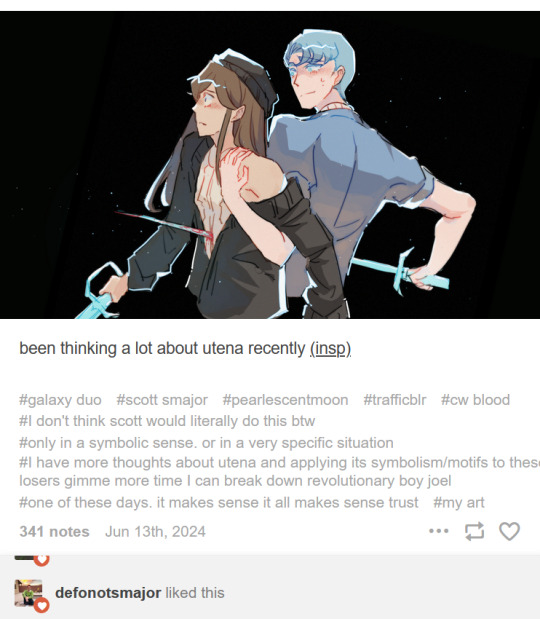
Here's an example of him liking my art that did not paint him in a completely morally good light.
Why can't gay people be calculating? Controlling? Abusive? Why are we applying a higher standard of morality to the gay CC when the rest of the fandom is having the time of their life calling Grian a homophobe, a murderer, calling Scar an arsonist, calling Martyn a loser and pathetic, so on and so forth. Is telling a story about an abusive gay relationship any more "problematic" than telling a story about an abusive straight relationship?
I don't want to imply anything about peoples intentions but it feels sometimes, to me, that the "homophobia" card is being played out of some obligation to protect Scott and his brand rather than out of genuine concern for homophobia in the fandom -- because then, I ask, where is that energy for critiquing the homophobic humour prevalent in CC circles?
I've certainly heard Jimmy make jokes about Scott's sexuality in videos before. Where's the breakdowns of the infamous "I am a straight man and would like to be represented as such" incident from Pirates? Where's that energy for referring to shipping as a "bit" or Etho "gagging" at fanart of him and Bdubs?
I'd even go to argue, in terms of homophobic caricatures, Martyn and Iskall are both often more akin to the classic "gay guy in love with you who won't take no for an answer" stereotype than Scott has been. Martyn at least we know is queer, does it simply not matter in his case? Despite the fact that Martyn is very much more villainized than Scott is, to the point where his Limlife win is often portrayed as maniacal and cackling rather than with the solemn acceptance of Scott's LL win or the heartbreak and regret of Grian's 3L win? Please know that I personally Do Not find these portrayals homophobic (although the Iskall side of things has peeved me in the past), I'm just questioning why homophobia in the fandom seems to start and end with one guy only.
In addition: "internalized homophobia" is certainly a thing, but the vast majority of toxic FH fans in my circle at least are very much gay. We're on Tumblr. Fork found in kitchen. I've seen more than one person express that Scott's behaviour in one or several of the seasons was reminiscent of a toxic or abusive ex, or reminded them of some other trauma. It just seems unkind to me to claim "homophobia" and then turn and tell very gay people talking about their very gay experiences that they are somehow The Problem.
Jimmy Likes It, Though
Often in response to toxic flower husbands posts, people will cite the many times Jimmy has said in the past that he actively requests to be bullied, as part of his youtuber persona, since he finds it funny.
I've always found this kind of strange, since unlike the homophobia claims which 99% of the time are unambiguously about the content creators, this is often said in response to people talking about the series as a story with characters first and foremost.
While the area of interpretation differs for all of us, most people do not choose to include behind-the-scenes youtube talk as part of their storyline, since this detail changes Jimmy's character drastically and impacts the tone of the series overall. So what, they were dropped into a death game arena and Jimmy... told everyone they should bully him, cus he thought it'd be funny? Offscreen, with no interactions or monologue in the series itself even alluding to it? It's kind of awkward to work in and there's really no reason to if what you are invested in is viewing the series as essentially an ultra meta theatre performance.
Now, I personally do work in some out-of-series material into my headcanons and interpretation, so let's say that Is a canon part of Jimmy's character -- maybe he knew the group beforehand and this was their established dynamic, or he simply offscreened it all. Now we have to deal with the fact that this is interpretation and the unreliable narrator aspect of the series.
Jimmy (the character) might've asked for this, but under what circumstances? Why does he want this? Is this really healthy behaviour or is it self-destructive? I never see this explored and instead "Jimmy says it's okay" is treated as word of god, which I find to be painful to deal with when it comes to this series (I'll get to this later).
Even if we throw out the character side of things completely, there are perfectly valid issues to have with this dynamic. I've seen people debating the ethics of presenting this type of humour to a young impressionable audience, I've seen people who find it upsetting because it reminds them of their own toxic friendships. CCs have no authority here, Jimmy does not decide where peoples discomfort starts and ends.
I admit this is a far reach, but indulge me and imagine for a second if the roles were switched and the homophobic jokes about Scott were what was leaned in to but Scott claimed he "liked being bullied". Would that be okay too?
People are Allowed to Dislike the Real Guy, it's Okay
There are plently of reasons to dislike CC!Scott that aren't rooted in homophobia, I can assure you.
Let's put it this way: Scott does not have to read this post if he doesn't want to. In fact, he'd have to actively go out of his way to see it in the first place. The fanfic writers are not calling him an abuser in his youtube comments section. This fandom bullshit is not clogging his notifications.
I don't dislike CC!Scott, I don't love him either but I think he's just kind of your average kind of a loser youtuber guy. But even if someone truly did find him to be the most abhorrent human being to walk the earth, talking about it on tumblr should not hurt him. You often see reminders that Jimmy is a grown man who can speak up if he finds things in videos hurtful, and I'd go on to argue that the same logic is never given to Scott who is, also, a grown man who can control his internet usage.
It's all just Minecraft and jokes
The most buzzkill of all rebuttals, in my opinion, is this argument that toxic flower husbands is "taking it too seriously" and that they are just "friends playing Minecraft".
Like when people bring up Jimmy's behind the scenes request, this confuses me because it is brought up 99% of the time to rebut posts that treat the series as a storyline rather than a youtube playthrough. You can't have the grief of Scott losing his husband and Grian's despaired suicide and Pearl's sanity slippage and still acknowledge that it is all "friends playing minecraft".
In fact I'd even argue flower husbands is pretty non-toxic if you look at it Purely from a friends playing Minecraft perspective, but that is never the case. Scott's grief over Jimmy's death is treated with utmost seriousness, but Scott hitting Jimmy for not listening to him or wanting to "whittle him down to nothing" never is. It's this pick-and-choose that drives me insane more than anything else.
In addition to this, while I might be mistaken, it seems like most FH fans are not super accepting of RPF so I wonder what the intent is in the first place.
Furthermore, I do find it odd when it seems like the issue is that abuse specifically is "taking it too seriously" in a series where murder is pretty much the main theme. Adultery is mentioned multiple times in Double Life. Martyn even says the words "toxic relationship" in Double Life regarding himself and Cleo. It's clearly something that is referenced directly in the series and not any darker than what is already commonly accepted in fanon, so I don't understand why it's such a taboo and gets hit with the "no fun allowed" stick more than Scar being a cannibal serial killer.
With the same logic, I could argue that Scott was serious when he said Jimmy was useless, redundant, etc. and joking when he said he was sad his husband died but. I don't do that. Because that'd be insane
But Scott Loved Jimmy
Onto the stuff that's more purely in-universe, the argument is more uncommon now but I used to see alot of claims that flower husbands couldn't have been toxic because Scott "loved" Jimmy, usually citing the positive interactions the two do have throughout Third Life.
I think this is kind of difficult to talk about because, to me, it comes from a genuine misunderstanding of how abusive relationships work and what they look like. I won't lecture the reader on the theory behind abusive relationships and the trauma bonding cycle but I will say that the good does not balance out the bad and sometimes, context is severely lacking.
E.g. the cake. Late in the series Scott bakes a cake for Jimmy and hides it for him to find. This is a moment that I think is fascinating because it showcases both Scott's genuine care for Jimmy and the sadism he gets out of Jimmy's suffering at the same time. Jimmy is actively afraid of the cake, says to Scott that he thinks it's a trap and tries to get Scott to try it instead because Scott was still on green. Scott simply laughs and pushes Jimmy to try it, later mocking Jimmy for being scared at all.
Scott not taking Jimmy's fear seriously in this scene always seems to get cut out, or is paired with the usual insistence that it's okay because it's a "joke", and the cake itself is what is focused on.
Long story short: Abusers can love and care for their victims, abusers can be romantically attracted to their victims, abusers can feel trapped in the cycle just as much as the victim (e.g. the classic "look what you made me do" wifebeater excuse).
"Home?" "Home." and Word of God
In a similar vein, lots of people point to Scott's Third Life ending as proof their relationship had a happily ever after. This is one example of a trend I see within rebuttals where Scott's word is often treated as canonical Word of God.
Word of God, for those unaware, is the concept in storytelling of communicating definitive, unbiased information to the audience. Some iconic examples would be the Star Wars intro scroll, or any of the "once upon a time..." set-ups in fairy tales. Sometimes a character will temporarily possess Word of God and lose it later, such as Katara's intro narration in ATLA.
The subversion of Word of God would be Unreliable Narrator, where the person telling you the information is, in some way, not to be trusted. Some media play entirely on this concept, the Stanley Parable being one iconic example.
My personal interpretation of the traffic series is that every POV is unreliable narrator, with some being worse offenders (e.g. Scar and Martyn). I feel like it does a disservice to other POVs if you simply take one as Word of God, since some characters really do seem different until you see their side of things (some poignant examples would be Last Life Joel, Last Life Scar and Double Life Pearl). However, I must say again, this is not Correct nor is taking one POV as Word of God Wrong. That's just the rules I'm used to operating under.
So first off, operating within my rules: the "home?" "home." scene only appears in Scott's POV and is never acknowledged outside of that one scene. Jimmy clearly remembers the events of Third Life but never says a thing about him and Scott's shared afterlife (more on Jimmy's behaviour post-3L in a bit) and neither does Scott himself. To me this scene has always been either a tragic dying hallucination or an outright lie Scott invented to cope with the events of Third Life. I don't think there's any reason for me to believe the Jimmy in this scene is really Jimmy.
With that being said: taking the scene at face value as something that actually happened and it being a real afterlife Jimmy and Scott were sent to, there are still sinister elements that go entirely unacknowledged. Scott specifies that the flower valley was decorated to his plans, never mentioning Jimmy's, the same valley he previously insinuated he designed specifically so that he'd be "over" Jimmy.
Including Last Life and beyond as part of canon: this is very much not the "happily ever after" for Scott and Jimmy as. Well. They don't stay there and end up getting thrust into another death game where, again, this scene is never spoken about again and Jimmy only acts more and more antagonistic towards Scott as the seasons progress.
Disregarding Last Life and beyond: there is so much ambiguity that it's hard to take it all at face value, are there any other players in this place? Are Scott and Jimmy doomed to die knowing no one and nowhere else? Can Jimmy walk 15 minutes westward and come across the home of the guy who murdered him? Or is this a paradise where all the players can remain? What about Scott, is he going to go back to treating Jimmy the same way he did when they were both alive? How does he deal with the fact that his dead husband is suddenly back?
I do think this last one (taking Scott's POV as word of god + disregarding everything past this point) is the closest you're gonna get to an entirely non-toxic reading of this scene, but even then you'd have to work with the previous episodes of Scott hitting and berating Jimmy continuously.
Finally, one last issue I take with the "Scott's word = Word of God" interpretation is that it is, once again, inconsistent. If Scott ever says anything to contradict his "good husband" persona it's written off as a joke, but him saying that Pearl "cheated on him" is treated as if she really did commit adultery. There's also things that are just ignored, such as Scott saying "You guys (the audience) are obsessed with flower husbands, when really it's just been me and Pearl," in Secret Life -- words that would imply he really did not care that much for Jimmy.
"Nuance."
I see people just saying the word "nuance" or "scott isn't abusive it's more nuanced" like that's an actual sentence with worth really often. I'm sorry this section is harsh but "nuance" is not an argument, abusers can have nuance, real people are always nuanced and real people can be abusers. To imply that abuse cannot be "nuanced" is a little insulting to me.
Please just say "idgaf" and move on this isn't politics we don't need flower husbands centrism
Jimmy is the Abusive One
This one drives me insane but I see it fairly often and I. honestly don't know what to make of it. Sometimes it's coupled with an insistence that you can make anyone in the cast abusive if you try hard enough which... yeah I, I agree. We're agreeing here.
Seemingly most prominent during Limited Life, there's some claims that people are unfair towards Scott and that Jimmy is the real abuser, but I find the examples of his behaviour weak more often than not because they are usually 1. in direct response to something Scott did, 2. using psychic powers to sense characters motives (such as claiming he is guilt tripping people when he apologizes when nothing suggests that is the case) or 3. behaviour that not only is not toxic, but is very much harmless
Examples of the third one include things such as him refusing to say "love you" back to Scott during Limited Life and Secret Life, which he is not obligated to do. Some people insist he "owes" it to Scott somehow for Third Life which I find not only overestimating how much Scott aided Jimmy during Third Life (Jimmy Did die first, after all) but kind of. Dangerous? To say that you can somehow "owe" another person love and affection if they perform enough chores for you.
Another is the claim that Jimmy acts overly flirtatious with other men which hurts Scott which. I feel like needs an essay or two on slutshaming to make my point clear.
What really does me in is that this point is often paired with the insistence that Flower Husbands Would Be perfect if Jimmy just stopped "acting out" and did what Scott wanted him to. I don't really know how to explain why I find that kind of bad.
To me, it seems as if it's almost an admission that the further away from Third Life you get, the more clear it becomes that Jimmy does not have the highest opinion of Scott and in order for the non-toxic interpretation to still apply you need to stretch things, which often comes with the unfortunate side effect of saying some historically not awesome things about people like Jimmy.
Why Only Scott?
This often comes in hand with the first point about homophobia, with claims that Scott is the only one accused of being abusive to Jimmy, when others like Grian and Joel are the same if not worse.
This is another take that's strange to me because.. It's just untrue? I think it might be the shock of the culture shift of toxic fh that's spearheading this, but most of the smallidarity stuff I've seen, for example, come with some level of acknowledgement that Joel is a massive bitch. Sometimes it's through bully x victim AUs or storylines where he learns the error of his ways, but he's a bitch to Jimmy like. Most of the time.
Solidarian is a much lower sample rate ship for a character with a way too high sample rate but Grian characterization ranges from "pure evil watcher who feeds off suffering" to "previous abuse victim with trust issues". Very few times have I seen Grian presented as purely good in interpretations.
MOST of the jausage stuff I've seen is straight up sausage being. Weird.
There was a hilarious confessions blog anon awhile back that tried to claim shipping scarian was somehow morally wrong because Scar(???) abused Grian(???). It happens.
To add to this: very few of Jimmy's other romantic interests were literally calling himself his "husband" while hitting and berating him. The only other "canon" couple I can think of that come close is Jizzie and the way Lizzie will sometimes hit Joel, but that is primarily outside of the life series and their crimes against eachother in the series are always capstoned by almost cartoonish antics of "still love you, tho" (e.g. Joel putting Lizzie's stuff in a chest after she gets killed by a zombie or them choosing to team up Despite it All near the end of Last Life) -- I have more thoughts regarding them but this isn't the toxic jizzie post so I'll leave it at that.
Very, very rarely will I see someone who believes flower husbands is toxic but thinks joel/grian/fwhip/sausage/etc. are Completely fine. I also think it might just be that people talk about Scott more since Flower Husbands is the Iconic Ship and that gets numbers biased into people Only thinking Scott is bad for Jimmy.
It could also be argued that some of the Double Life pairings have the same level of toxic married couple energy that Flower Husbands does, but I'd argue that the soulbounds have enough variety that interpreting them as wholly romantic is difficult to do. There was also less hype overall with some of the most "toxic" pairings in DL, such as Impdubs or Box Boys, which makes it hard to find content for them -- I did a whole little liveblog of it calling Impdubs toxic as fuck. Y'all just didn't see it. Most of DL's toxic relationship themes also come from divorce quartet but admitting that those four have romantic tension in-universe gets you sniped in this economy.
To end: I talk about Scott more than the other guys because. I like him more. I like talking about people I like.
Conclusion (AKA who fucking cares)
I feel the need to restate my intro: no one actually fucking cares.
I've been talking about inconsistency in the "rules" of interpretation throughout this and I stick by my word but I think I'd have to mention that, in order to view this series as a storyline in the first place, you'd have to make some exceptions. I don't listen to the lines about youtube or viewers or when Grian talks about planning the series. I don't think it'd be Wrong to view Scott's POV as Word of God, disregard everything that implies he's a bad husband, not consider anything past "home?" "home." canon, so on. It would not be an interpretation I, some random asshole on tumblr, enjoy personally but if you're having fun you really should not give a shit about me.
However that doesn't mean people can't be rude or just straight up wrong or hypocritical when they claim toxic flower husbands interpretations are "homophobic" despite being antagonistic towards the gay people writing them in the first place (I've seen a ridiculous amount of middle school level namecalling for like no reason??) or claim that the interpretation is for people who "haven't watched their POV" as if a certain takeaway of a minecraft series presents you with some sense of superiority for understanding the cube guy harder than those horrible, horrible HATERS who think Scott killing himself over and over is sad to watch.
Oh and don't mention Pearl's role in all of this the only time I've seen someone try to bring her up I had to read it like five times and I'm still not quite sure I understand
128 notes
·
View notes
Text
little learning time: homophones
All characters are 18+
Today, let's talk about homophones!
That's a big scary word, isn't it? But it's nothing to worry about! A homophone is just a word that sounds the same as another word, even though it looks different and has a different meaning. Can you think of any examples?
Here's one! We and wee are homophones!
We is a word that's used to talk about yourself and other people together! For example:
"We need to talk about your potty habits," Mummy told Lily.
You see how here, Mummy is talking about herself and Lily?
Wee is different! It's what makes your nappies all warm and soggy sometimes! Or if you're super big and your mummy trusts you not to make a mess, maybe you do your wees in the potty. For example:
"I didn't wee on the floor!" Lily argued.
You see how here, Lily is talking about wee as an action she 'didn't' do? That means it's a verb, but we haven't learnt about those yet, so don't worry! Wee can also be a noun. We did learn about those. Do you remember what they are?
That's right! They're words that name a certain thing. For example:
"Did you do a wee in the potty, Lily?" Mummy asked.
Can you remember how to pick all the nouns out of this sentence?
It's important to know about some common homophones because if you don't, you might use the wrong word, and then your sentences won't make sense! Your mummy might even think it's just baby babble!
Look:
"Wee need to talk about your potty habits," Mummy told Lily.
That doesn't make much sense, does it now?
There are some super important homophones that are really easy to get wrong! Shall we learn them?
The first set of homophones come as a three! Can you count that high?
The words are to, too, and two. Let's take them one by one.
To is a word we use to show direction and movement. We could say that Mummy went to the nursery, or Mummy gave the bottle to Lily. Can you tell what's moving in each sentence?
Too is a word that means 'more than the right amount'. We could say that Lily was too little to use the potty, or Lily's nappy was too wet to last the night. You could remember this one by thinking that it has too many Os — more than both the other homophones in the set!
Two is a number! How are your maths classes going? We could say that Mummy has two little girls, or that Lily did a number two in her Pull-Up. Pee-yew! You could remember this one by thinking that the W in the middle is like two Vs stuck together. Or is that too complicated for little brains?
You should also know the difference between there, their, and they're!
There is a word we use to talk about places! It means 'in that place', or 'at that point'. It can also be used to say that something is present. We could say that the potty is over there, or that there were lots of nappies for Lily in Mummy's bag. You can remember this because the word there contains another word that we use to talk about places. Can you spy it? The word is 'here'! Why not write out the phrase here and there a few times? I'm sure that will help you remember!
Their is a word that we use to talk about things belonging to other people! Remember when we talked about nouns? Their is a word that describes who a noun belongs to, and that means it's a type of word called an adjective! But don't worry about that too much, we'll learn about adjectives another day. We could say that Lily and Katie loved their Mummy, or that when Lily tried to be big, Mummy and Katie rolled their eyes. How do you think we can remember this one? Would you like to come up with your own rule?
A rule that helps us remember something is called a mnemonic! Can you say that word? That's ok, it's a very tricky word for little mouths! Maybe it would help if you took your dummy out?
Remember, their is a word that you use to talk about things belonging to more than one other person! You can also use it to talk about things belonging to your nonbinary friends or caretakers, if they use they/them pronouns! It's super important to be respectful of other people's identities when you talk about them.
Now let's talk about they're! See how it has an apostrophe in the middle? An apostrophe is a special mark that does lots of different jobs, but in this word, it's telling us about something called a contraction. That means that this word should have extra letters in it! Can you guess what letters?
They're is a contraction of they are! See how the a of are has been taken out, and the two words have been joined together? Because this is a phrase that gets used lots and lots, people have come up with this shorter form to make it quicker to say and write. We could say they're both getting their nappies changed, or they're going to bed early.
This one is super easy to remember! You just need to look at your sentence and decide if it would make sense to replace they're with the words they are.
Do you want to try it?
Let's take this sentence from earlier, Lily and Katie loved their Mummy. If you got a little bit confused and wrote Lily and Katie loved they're Mummy, you could use this trick! So the sentence would say Lily and Katie loved they are Mummy.
Does that make sense? No, I don't think so either! So now you know that they're isn't the homophone in this sentence!
They're is used to talk about what two or more people are, or what a nonbinary person using they/them pronouns is! If you're talking about a single person who uses he/him, she/her, or other pronouns, you have to use a different contraction. Some examples are he's and she's.
Do you know about homophones now? Are you sure? Let's find out!
Can you choose the right homophone in the following sentences?
Lily and Katie are to/too/two confident about there/their/they're potty training.
The to/too/two of them decide they don't need there/their/they're nappies any more.
They think they can make it to/too/two the potty every single time.
There/their/they're not right about that, are they?
They take there/their/they're nappies off when Mummy isn't there/their/they're.
Lily and Katie are really to/too/two little to do this, though!
There/their/they're are lots of puddles on the floor when Mummy gets home, and she's cross.
Her to/too/two little girls have pottied everywhere without there/their/they're nappies on!
She smacks there/their/they're bottoms and puts them to/too/two bed early.
It's lucky Mummy has to/too/two boobies to/too/two give her to/too/two babies there/their/they're nighttime feed faster.
How are you feeling? Do you think you picked all the right homophones? Let's see!
Q1
The first homophone here is too! Remember, it means 'more than the right amount'! How much confidence do you think is the right amount for Katie and Lily to have in their potty training?
The other homophone in this sentence is their, because it's the potty training belonging to Katie and Lily — it's theirs, even if there isn't very much of it!
Q2
The first homophone here is two. Why's that? Remember, two is a number! Can you count that high? One little girl and another little girl make two little girls! The next answer is their. The nappies definitely belong to Katie and Lily! They're not Mummy's, she's far too big! What kind of nappies do you have? Are they as adorable as you are?
Q3
There's only one answer here, and it's to! Remember, we use this one when we're talking about movement. Katie and Lily are moving to the potty — or at least, they should be. Do you go to the potty, or does the potty come to you? Or are you too little for that, and you still potty in your pants?
Q4
The answer in this sentence is they're. Look at the sentence! You could use they are instead, right?
Do you think you're right about how good your potty training is? Does your mummy agree with you? You should listen to her! Lots of little ones get overconfident if they sometimes manage to get their wees and poos in the potty, but good mummies know that potty training is a long process and little ones can't always be trusted!
Q5
This sentence is especially tricky, because it has two homophones in it that sound the same as each other! The first one is their. That's because the nappies still belong to Katie and Lily even after they take them off. When your mummy takes your soggy nappies off, they're still yours! And no one else wants them, do they? That would be yucky!
The second one is there. How do we remember this one? That's right! It has the word 'here' in it, so it talks about places! This sentence is about where Mummy is. What does your mummy do when she's not there? Does she leave you all by yourself, or do you get to play with a babysitter?
Q6
The answer here is too! That's a tricky one, because of course, Katie and Lily aren't too little — they're just the right amount of little! But they're too little for the specific situation we're talking about, aren't they? Only very big girls get to go without their nappies, and it's always up to their mummies to decide when that happens!
Q7
Did you get this answer? That's right, it's there! Remember, we can use this one to talk about things that are present. That's not like a Christmas present, though. It's a word that just means the thing exists in a certain place, like these puddles exist on Mummy's floor. But of course a present could be present! I'm not sure Mummy wants any soggy yellow presents, though — and it's not even Christmas!
Q8
There are two homophones to decide on here, but we've seen both of them before! Do you remember? The first one is two, the number of little troublemakers that Mummy has. Do you have a sister, brother, or sibling? If you do, you have to be super grown up and good at sharing your mummy!
The second one is their. We talked about how the nappies still belong to Lily and Katie even though they took them off, didn't we? That's a very naughty thing to do, remember!
Q9
This answer is their again! That's because the smacked bottoms belong to the little girls, even though they probably wish they didn't! Do you get your bottom smacked sometimes? That's ok! Learning to be good is super hard sometimes, but it's just as important as learning all about homophones, and a smacked bottom is a really good reminder, isn't it?
The second answer is to. It's a direction of travel, isn't it? Mummy is taking her little cuties upstairs and tucking them into their cot! When's your bedtime? Is it nice and early so you're wide awake for school?
Q10
This is the last question, and there are lots of homophones to find! Did you get them all? Let's see!
The first one is two again! It's another number! Mummy has one boobie for each of her two babies — isn't that lucky? Do you have to share your mummy's boobies, or do you get them all to yourself?
The second answer is to. This is a little bit different, isn't it? It's not about movement, but you can also use to to mean something like 'so that'. Do you see how that works? Here, it's lucky Mummy has two boobies, so that she can feed both her babies at once!
The third homophone is another two. Did you know that? It's easy to work out! This sentence is telling you that Mummy has the same number of boobies as babies, so it uses the same word to describe each of those things!
And finally, the last homophone is their! Did you get it? The nighttime feed is a special time that belongs to Lily and Katie, when they can cuddle up together and spend time with their Mummy as a family. Doesn't that sound nice?
Did Katie, Lily, and Mummy work together to help you learn all about homophones? Do you think you know them super well?
Why not write a little list of all the homophones you can think of, and then try writing some sentences using them? Make sure to get them the right way round!
#ab dl girl#dearchloeteaches#little learning time#little linguistics#ab dl diaper#diaper pee#dearchloewrites#anr
107 notes
·
View notes
Text
Neil Gaiman's CHIVALRY: From Illuminated Manuscripts to Comics
One of the many reasons I wanted to adapt Neil Gaiman's Chivalry into graphic novel form was to create a comic as a bridge and commentary re: comics and illuminated manuscripts.
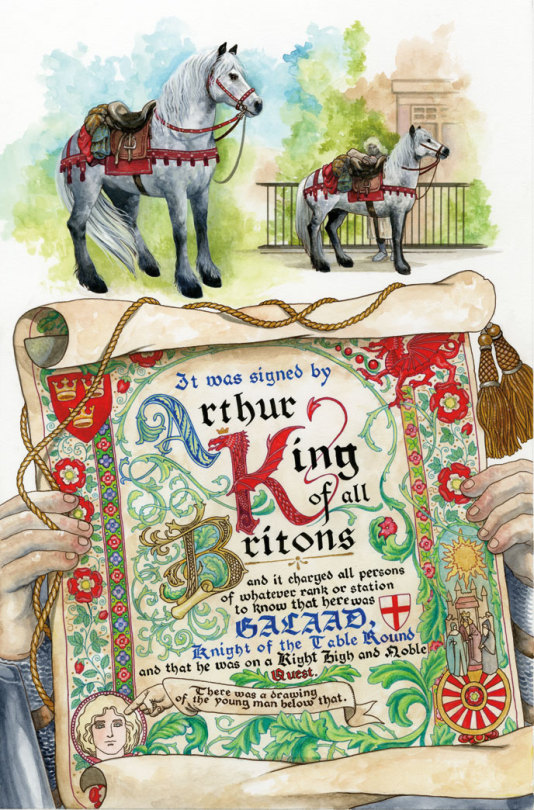
We're often told that the first comic book was Action Comics #1 featuring Superman, a collection of Superman comic strips that morphed into comic books as an art form.
Sequential art predates Action Comics #1.
Action Comics popularized sequential art book storytelling that had already appeared in other forms in fits and starts throughout history. Comic books didn't take off as a popular medium for several reasons, not least of which was the necessary printing process hadn't been invented yet and it's hard to popularize - and commercialize - something most people can never see.
You find sequential art in cave paintings and in Egyptian hieroglyphics. I've read that comics (manga) were invented by the Japanese in 12th century scrolls.
And sequential art appears over and over again in Western art going back well over 1000 years, and in book form at least 1100 years ago.
The most obvious example of early sequential art in Western art - as a complete narrative in sequence - is the Bayeux Tapestry.
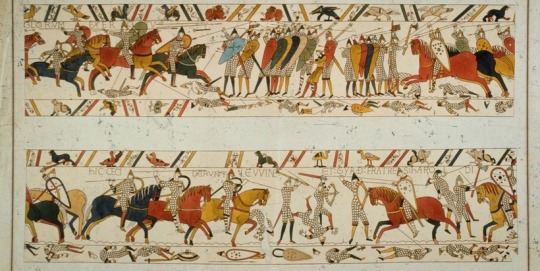
At 230 feet long, this embroidered length of cloth was likely commissioned around the year 1070 by Bishop Odo, brother of William the Conqueror. It depicts the Battle of Hastings in 1066 and the invasion of England by the Normans. (The tapestry was made in England, not in France, but it is called the Bayeux tapestry because that's where it is now.)
Imagine what a task it was to embroider this thing. Whew. And you thought it was hard learning Photoshop.
This work of art is important in the history of sequential narrative, but the Norman invasion is also important to the legend of King Arthur - and another important English legend - for reasons we'll get into later.
It's complicated.
All this is why you see this art in the background of this page of Chivalry.
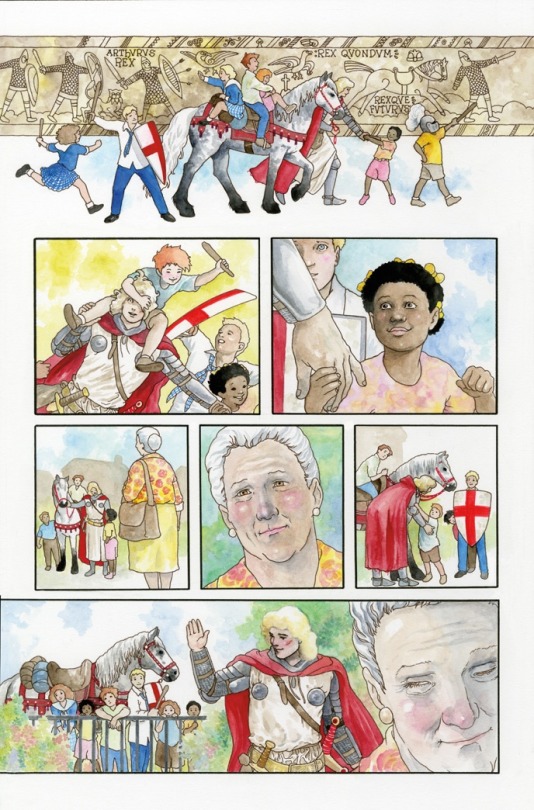
Using the Romanesque art style of the tapestry in panel 1, I've added the Latin phrase "Rex Quondom, Rexque Futurus" - "The Once and Future King", the final words of Sir Thomas Malory's Le Morte d'Arthur as inscribed on King Arthur's tomb, and the title of T.H. White's famous Arthurian novel. (EDIT) and it has been kindly pointed out to me that QUONDOM should be QUONDAM, which is hilarious and annoying and this is how history gets rewritten by accident.
My original intention was to draw this Bayeux Tapestry scene out and juxtapose it with shots of Galaad interacting with the children, but the two page sequence I imagined didn't really work as well in reality as it did in my head.
Foremost among my concerns was that the tapestry reference might be too obscure for most readers. I wanted to weave the visual meta-text of Chivalry into the story (For further reading on this project and my use of visual meta-text, symbolism, and history in Neil Gaiman's Chivalry, go HERE. And HERE. And HERE. And Yet again HERE.) in such a way as it would enhance the experience for people who "got" the visual meaning, while not dragging things down for people who didn't. So I cut this scene down to one panel.
The tapestry is a complete, long form comic strip created over 1100 years before some people claim comics were invented. So, I loved being able to reference it here.
But even more interesting to me are the sequential art sequences that appear in illuminated manuscripts - comics in book form.
I once got into a rather vicious argument with an academic who insisted illuminated manuscripts were comics. I said no. She said yes. Then she insulted the lowly comic artist and blocked me on Facebook.
Whatever.
My point was not that you can't find sequential art in illuminated manuscripts. My point is that an illustrated book isn't de facto a comic. Most illuminated manuscripts are illustrated books. Some illuminated manuscripts contain sequential art.
Just because opera is music, that doesn't mean all music is opera.
Just because comics books are books that doesn't mean all books are comic books.
And just because some illuminated manuscripts contain sequential art, that doesn't mean all illuminated manuscripts are sequential art.
But one is.
Let me show you it.
One of the earliest examples of an illuminated manuscript with comic art is The Bible d'Etienne Harding which you can see in this really bad jpg here, sorry, best I could find.
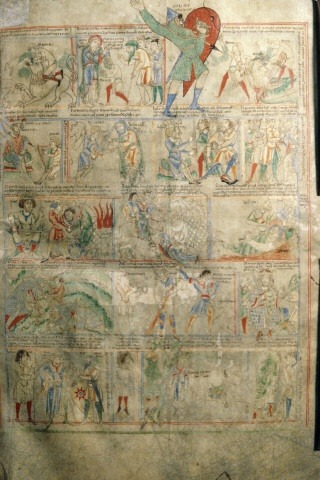
Created around the year 1109, property of a French Cistercian monk, it combines sequences like this with pages of text and illustration.
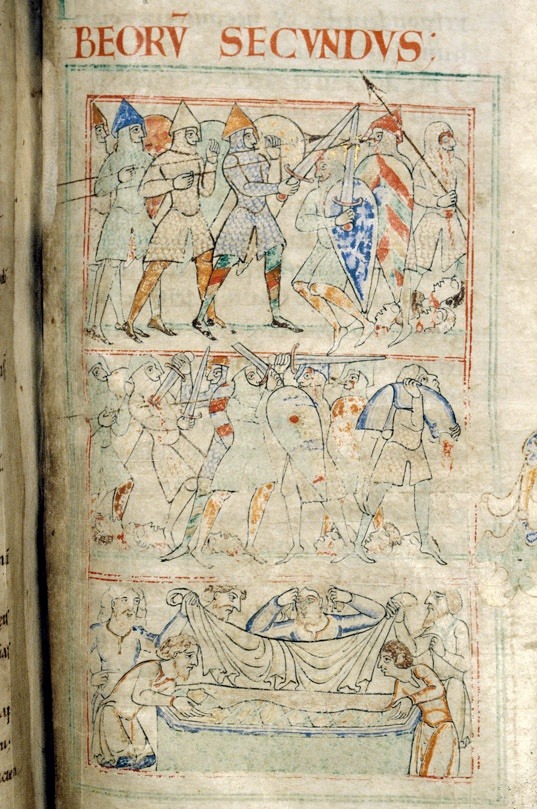
Not a comic book IMHO, but an illuminated manuscript with sequences of text, illustration and sequential narrative.
It's no more a "comic book" than a newspaper is for having text, illustration, and comic strips in it.
IMHO, academic lady.
And here's a look at the Old English Hexateuch (hexateuch refers to the first 6 books of the Bible) which I think is far more visually complex and interesting work, and comes much closer to the illuminated manuscript as comic, but still intersperses large sequences of text and illustration with sequential storytelling sequences. So I don't consider it a comic, but a book with sequential work in it.

Now this work below is a different matter. This is from the Holkham Bible Picture Book, circa about 1330.
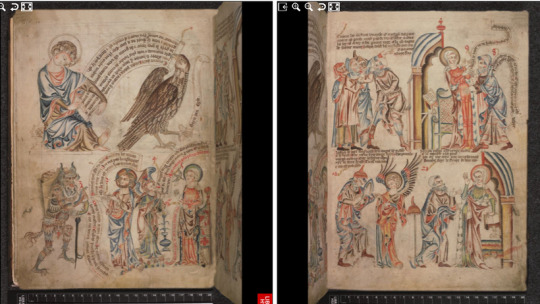
This thing is genius. It measures a little larger than a modern comic, around 8"x11", and almost every page of it is like this spread here. 231 pages of beautifully rendered art, with repeated use of banderoles - "speech scrolls" (basically word balloons) - and captions, and (mostly) real sequential art. I've never seen anything else that comes even close to it, and by all accounts, neither has anyone else.
It may not be a modern comic book - but it's a comic book as far as I can tell. I don't think there's any other illuminated manuscript that is as complete, sophisticated, and innovative a sequential storytelling work.
If this were printed and seen by more people, the comic book medium would have taken off centuries earlier, IMHO. But it wasn't. It was tucked away in a monastery somewhere and few people ever saw it. It ended up being forgotten for centuries until it popped up again around 1816 when a banker sold it to an avid book collector, Thomas Coke, Earl of Leicester, who inherited Holkham Hall and its library and set about restoring and expanding it.
The banker wrote, “a very curious MS. just brought here from the Continent. . . which I think one of the greatest curiosities I ever saw”.
Sequential art got invented over and over and over by one artist after another until one day centuries later, some teenaged boys found their newspaper strips gathered together in a cheap format, and suddenly comic books were popular and like new.
And then a lot of people who didn't seem to realize that books had had pictures in them for centuries got all up in arms about the harms of books with pictures in them.
I think it's funny that it is called the Holkham Bible Picture Book. There really was no "comic" art language when this work was created or when academics began to catalogue this sort of thing. Will they change the name now?
Who can say.
Anyway, another Holkham Bible Picture Book reference for you.
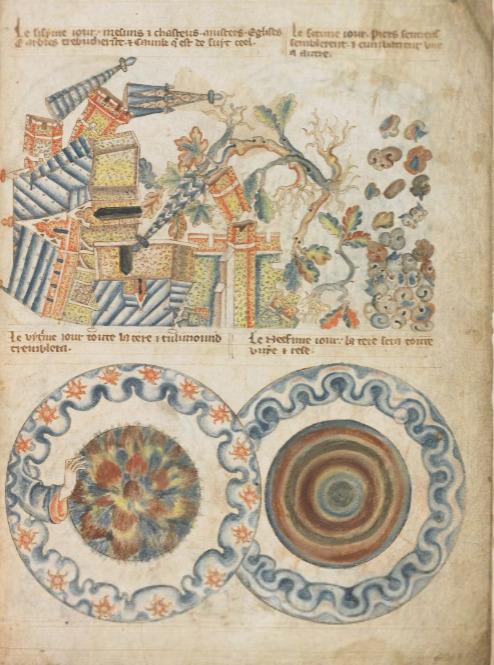
Look familiar?
I referenced it in this scene in Chivalry.
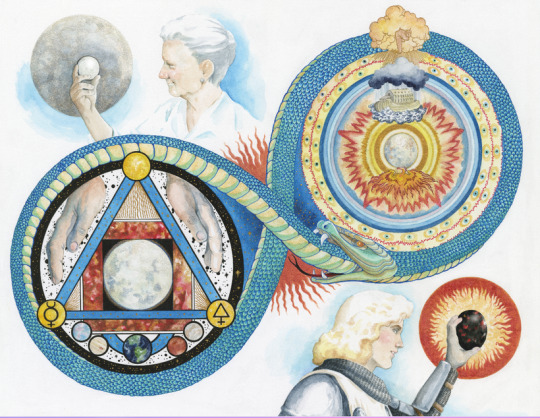
One of the fun things about the Holkham is that it opens with a discussion between a friar who has commissioned the work and the artist. The friar admonishes the artist to do a good job on the project because it will be shown to important people. And the artist responds, "Indeed, I certainly will and, if God lets me live, never will you see another such book."
He wasn't kidding.
You can see the entire manuscript HERE.
Sponsored by my Patreon. Thank you.
#chivalry#neilgaiman#neil gaiman#darkhorsecomics#dark horse comics#illuminated manuscript#medieval art#medieval manuscripts#watercolor#watercolor art#king arthur#arthuriana#arthurian legend#sir galahad
2K notes
·
View notes